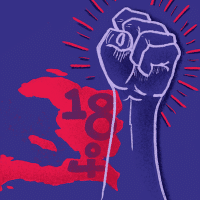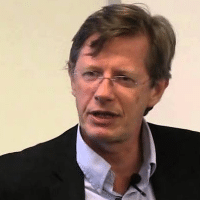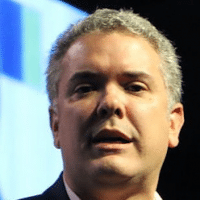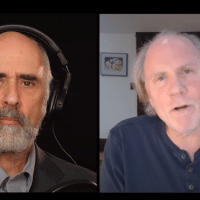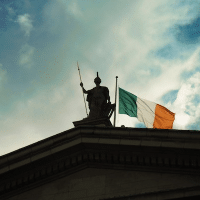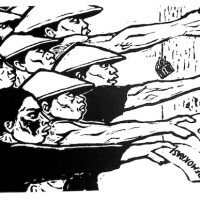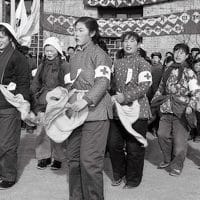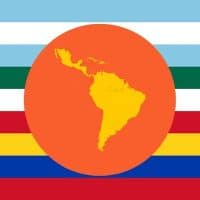-
Lessons from the attack on the U.S. Capitol
What happened Jan. 6 at the U.S. Capitol was a violent takeover of Congress by a fascist mob, not a “protest by Trump supporters.” And, although five people died and there were more than 50 arrests, it’s obvious to the wide public that these overwhelmingly white lawbreakers were handled much differently than they would have been had they been Black or other people of color.
-
We are living in an emergency that requires urgent action (a note written with Noam Chomsky)
The first newsletter of the new year is written in collaboration with our friend, the great linguist and prophetic voice, Noam Chomsky. What follows is a statement by Noam and me.
-
Chomsky and Prashad: Three major threats to life on Earth that we must address in 2021
Large parts of the world—outside of China and a few other countries—face a runaway virus, which has not been stopped because of criminal incompetence by governments.
-
You don’t want to imagine an ocean without coral reefs—but you might have to
The reefs will die. That seems certain. The UNEP report will not circulate. That seems equally certain. The Marshall Islands and Rwanda will file their updates. That has already happened. Meanwhile, the United States and its allies will sit on the sidelines, expanding fracking with a “who cares” attitude.
-
Venezuela Elections: A key victory for anti-Imperialist Movement in Latin America
The people of Venezuela have dealt another decisive blow against U.S. domination in Latin America. The successful continuity of two decades of Venezuelan Bolivarian revolutionary process has turned Venezuela into the backbone of the Latin American anti-imperialist and revolutionary movement.
-
Dossier no. 36: Twilight: The erosion of U.S. control and the multipolar future
If there was one revolution that marked the beginning of the end of the colonial epoch and that inaugurated a new worker-led civilisation, it was the Haitian Revolution of 1804. Enslaved Africans defeated the four major European powers of the day, won their freedom, and declared an independent republic.
-
As South African climate justice veterans fall, consciousness begins reviving, from below and across
On three days last week–December 23-25–South Africa’s east coast province of KwaZulu-Natal (KZN) lost three of its clearest voices for social justice and environmental sanity: rural women’s leader Sizani Ngubane (74), trade unionist Patrick Mkhize (60) and progressive activist Faith ka-Manzi (52).
-
Colombia’s President shows his disdain for democracy and Venezuelans
On December 8, a Conviasa flight prepared to take off from Caracas, Venezuela, for Mexico City. It planned to carry 200 election observers and journalists who came to Venezuela from a range of countries to monitor the National Assembly elections that were held on December 6.
-
The decline of American Journalism
The media is driven by the enormous profits made during election campaigns. Feeding the fury and the fear of all types is just good for business. Bob McChesney joins Paul Jay on theAnalysis.news podcast.
-
An icy rally with burning demands
The survival of polar bears, we know, is sadly threatened. The survival of a more colorful bear species seems assured. HARIBO (an acronym of HAns RIegel BOnn), which makes those little “gold bears” sweets, was founded in a laundry room in 1920.
-
Ireland and U.S. Imperialism
When discussing Ireland’s role in imperialism today it is vital to highlight the role Ireland plays in assisting the U.S. to extract profits from ‘poorer nations’. That is to say nations that have abundant natural resources that the mass of the local population do not get to reap the benefits of.
-
The pillage of resources: A glimpse into the lives and labor of marginalized women
Lives of women dependent on natural resources, such as land, forests, rivers, and mountains, are being tossed asunder by the appropriation and expropriation of these resources by corporations and the state.
-
A racist endeavor: Zionist Israel’s Black Jewish victims of color
Even when reports of its racism escape this ideological censorship, examples of racism in Israel are treated as isolated incidents, rather than systemic characteristics of the entire racist regime.
-
Venezuela wins simply by holding an election
The upcoming legislative elections in Venezuela are going to be held in a context of great adversity are an important step in the democratic recuperation of the country’s institutions from the U.S.-backed opposition.
-
Dossier 35: The Legacy of Lekra: Organising revolutionary culture in Indonesia
Martin Aleida recalls the moment he was released from prison at the end of 1966. At twenty-two, Martin emerged from nearly a year behind bars to Jakarta, unable to find his friends and comrades.
-
We suffer from an incurable disease called hope
The total level of global indebtedness now sits at an astronomical $277 trillion, an increase of $15 trillion since 2019. This amount is equivalent to 365% of the global gross domestic product.
-
Why imperialism is obsolete in Latin America
An interview with Jorge Arreaza, foreign minister of Venezuela.
-
Why Biden will keep the U.S.-imposed Cold War rolling
Much will certainly change in the world of U.S. foreign policy when Joe Biden enters the White House. There will be a more measured tone, and less reliance upon Twitter to announce U.S. policy.
-
Airports and rallies
Ding-dong, the wicked witch is dead! A wicked but very male Witch of the East seemed to be crushed under a houseful of angry voters, though this house, unlike Dorothy’s in The Wizard of Oz, was definitely not from Kansas!
-
Dossier 34: Paulo Freire and popular struggle in South Africa
He constantly experimented with and thought about how to connect learning and teaching among the poor and oppressed with the radical transformation of society.






